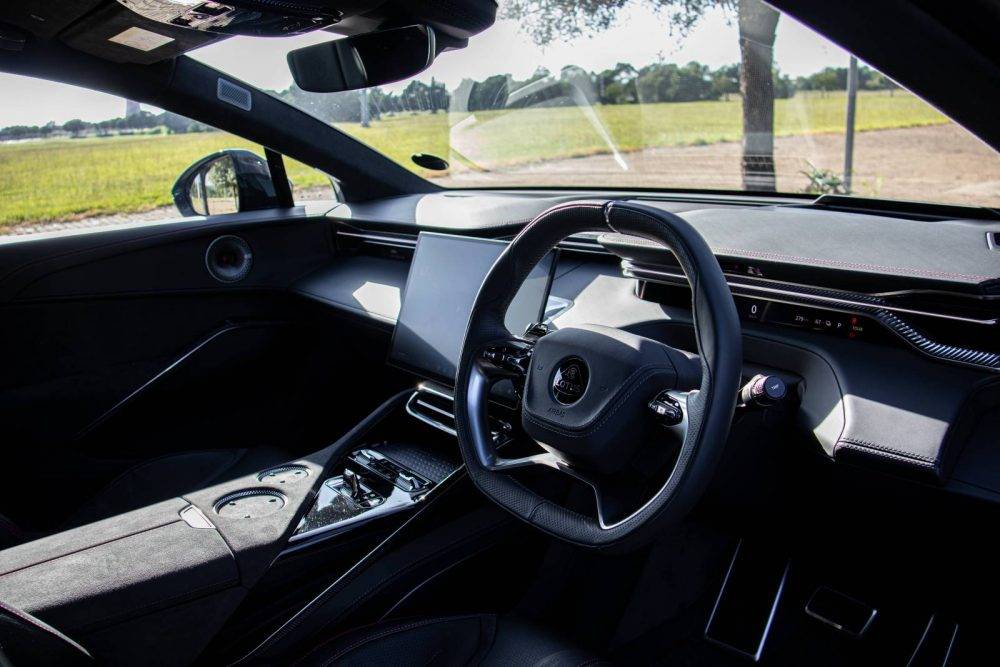Lightweight construction, a mid-mounted engine and a low-slung cabin are elements characteristic of the Lotus brand ethos, as espoused by its founder, Colin Chapman.
The Elan, Elise and Exige will remain the poster children of Colin’s vision but the British sports car brand is moving in a new direction, as we reported back in 2021, as part of its expansion plans.
That is to say, it’s taken a leaf out of the Porsche handbook by venturing into a segment it’s never played in before — the performance SUV.
Pretty much every premium and sports car manufacturer now also builds SUVs. The buying trends dictate this and carmakers are heeding the clarion call to adapt or die.
What you see here is the first SUV from Lotus, the Eletre, earmarked to be its first hyper-SUV, thanks to colossal power outputs that, even on paper, make your eyes water.
But before we get into the raw figures and how these translate to the tarmac, it is the styling that sparks conversation and gets onlookers finger-gesturing and double-taking.
Boasting enough air vents and venturis to make a Formula One car jealous, Lotus says the Eletre’s design is sculptured by the wind, so it is safe to say that aerodynamics are key to how it slices through the air.
There’s a lot to drink up and one can safely say that the designers’ creative ink flowed with a fluidity resembling Victoria Falls.
The overall design, which takes cues from the Ferrari Purosangue and Lamborghini Urus, is tastefully executed to arrive at a model that will appeal to those who appreciate a well-chiselled style of car.
Those 23-inch wheels, with their throwing-star design, fill the arches with purpose, offering excellent purchase off the line, thanks to the 315/35 section tyres on the rear axle. That is to say, grip levels are prodigious, while these hardly exhibited a fidgety ride quality.
Of course, there is no masking the car’s portly weight once you start playing corner-tugging with it. Still, it remains impressive how a big lump of SUV metal like this can shift.
And, oh boy, does it shift! Thanks to two electric motors, one on each axle, the Eletre in this flagship R trim thumps out a staggering 675kW and 985Nm, driving all wheels through a 2-speed automatic gearbox.
To truly appreciate this staggering feat, one needs to drive in this vehicle.
Claimed to be able to hurtle from 0 to 100km/h in 2.9 seconds, there’s no launch control here. All you do is switch the drive mode to either Sport or Track (there’s also Tour and Off-road), and the car’s air suspension lowers — you simply stomp on the loud pedal.
The acceleration off the line is immediate as the car’s nose points skyward, the rear squats down, while those gumball tyres dig in.

It slingshots forward with verve and, just as you think you’re motoring, the transmission shifts into the next gear, the rear tyres squirm as they struggle for purchase, and things begin to get seriously fast, as though the afterburners on a launch rocket had just been lit.
The resultant G-force could be likened to falling off a cliff during a bungee-jump. I have driven some very quick cars in my career but this — and for an SUV — is simply staggering.
A full charge will give you around 400km to 455km, which is not terrible, especially taking into consideration the performance on offer.
What we did not have time to do while we had the car on test was to see how the charging integration was calibrated so, sadly, we’re not in a position to comment.
When you are not busy leaving exotic metal in your wake at traffic light showdowns, you can ease into the well insulated, cocooning cabin which boasts high-quality surfaces for the most part.
The only criticism is that the infotainment screen feels a tad tacky but the user experience is as good as the best in the business.
Built on the parent company Geely’s EV platform, the Chinese-manufactured Lotus Eletre showcases how a car firm built on a steep history of racing small and light sports cars can reinvent itself to become a relevant player in the super-premium segment of the market.
Also, the fact that it has direct competitors in the electric SUV space should make it a unique proposition.
Its biggest hurdle, however, is to convince potential buyers to forgo petrol-powered super-sport SUVs, as the Lotus brand in SA still needs to do a great deal of groundwork before it can be spoken of in the same breath as the Aston Martin, Porsche and Lamborghini.
Also, the fact that it has no direct competitors in the electric SUV space should make it a unique proposition.
Price: R5 million, before taxes.